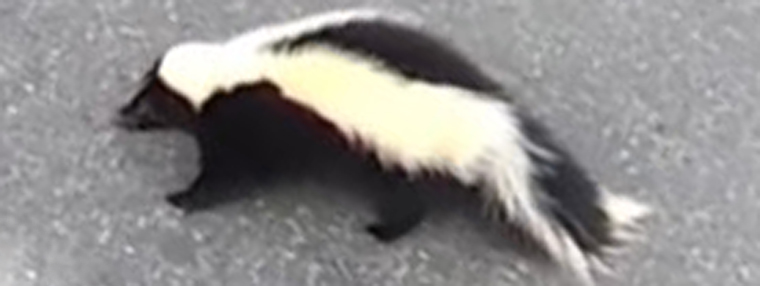-
info@aaanimalcontrol.com
Call us for help in your town
Humane Wildlife Education
Biology Information About Skunks
Need skunk removal in your hometown? We service over 500 USA locations! Click here to hire us in your town and check prices - updated for year 2020.
Most people will know a few basic facts about the
skunk, but most of these may have been learned
through the cartoon character 'Pepe Le Pew', so
something a little more scientific can provide a
more accurate picture of the animal. With a
distinctive appearance that can often appear quite
cute, when you understand some of the behaviors of
the animal, this cuteness can quickly become a
perspective on a real pest animal.

Appearance
Similar in size to that of a cat or a dog, the
most distinctive part of the appearance is the
white stripe running down from the snout down the
back and up a large bushy tail. The animal tends
to have larger hind legs, with shorter front legs,
and the tail tends to be held more vertically than
other species, and it does stick up.
Biology
Depending on the species, the animals are usually
between sixteen inches and thirty seven inches in
length, and although smaller species can weigh as
little as a pound, most will be heavier, with the
largest weighing around eighteen pounds. Due to
their hunting behavior, skunks tend to have long
front claws to help with digging.
Life Cycle
Skunks usually give birth in late spring after a
gestation of around two months, with females
having litters of between four and seven kits.
They are blind and deaf at birth, but open their
eyes after three weeks, and are eventually weaned
after two months, but stay with the mother for the
first year. Skunks can live up to seven years, but
many are killed in the first year.
Habitat
Skunks will usually live in burrows that they have
dug below ground level, and particularly in colder
areas these dens can be home to several skunks. In
the wild they tend to prefer woodland areas where
they can forage and hunt easily, but they are
adaptable, and many have adapted to living in
urban and suburban areas.
Diet
Skunks are true omnivores in that they eat a lot
of fruit and vegetables, including berries, nuts,
grass and leaves, while they also eat insects
including bees, and can eat small rodents, birds,
frogs and snakes. This adaptable digestive system
has also led them to be successful at adapting to
different habitats
For more information, you may want to click on one
of these guides that I wrote:
How much
does skunk removal cost?
How
to get rid of skunks - my main skunk removal
info guide.
How
To Keep Skunks Away From Your Property
What
To Do If A Skunk Gets Into A House, Bedroom Or
Kitchen?
What
Are Some Humane Ways To Kill A Skunk In A Cage?
Should
I Hire A Professional Or Remove Skunks Myself?
Do
Skunks Make Good Pets?
How
To Keep Skunks Out Of My Garden
How
To Keep Skunks Out Of My Garbage Cans
How To
Use One-Way Exclusion Funnels To Remove Skunks
Without Trapping Them
Is
Skunk Feces Dangerous To Touch Or Breathe?
Do
Skunks Jump?
How
To Remove A Skunk In The Basement
Home
Remedies To Keep Away Skunks And Get Rid Of Them
Do
Skunks Live In Groups Or Alone?
The
Fastest Way To Get Rid Of Skunks
Do
Skunks Dig In Lawns Looking For Food
What
Are The Common Problems That Skunks Cause?
How To Remove Skunk Odor From Typical Places It Has Sprayed
How To Find And Remove A Dead Skunk
Where Should I Relocate A Trapped Skunk?
Should I Ever Poison A Skunk?
Are skunks dangerous to cats, dogs, or other pets?
Will A Pest Control Company Remove A Skunk?
How To Get Skunks Out From Under Your Shed Or Porch
What Is A Skunk’s Natural Diet?
The Mating And Birthing Cycles Of Skunks
Do skunks dig in lawns looking for food?
What Are Some Ways To Kill A Skunk In The Yard?
Do skunks kill chickens?
Do skunks hibernate in the winter?
Baby skunk scent gland removal
Can a skunk climb a fence?
What is a skunk's typical diet?
Do skunks jump?
How to remove a skunk in the basement, attic, or anywhere in a house


















